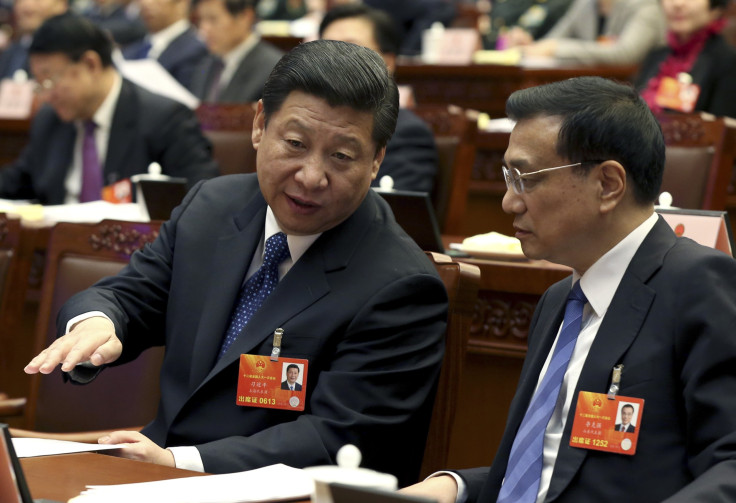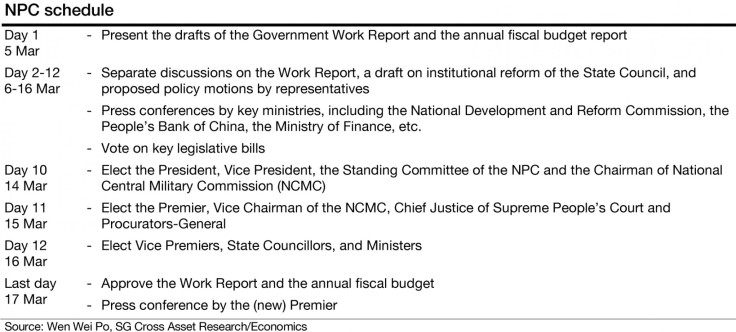Chinese Premier Wen Jiabao To Deliver Government Work Report At China’s 12th National People’s Congress (NPC) Session And Announce 2013 GDP Growth, CPI Inflation Target

The annual meeting of China’s parliament, the National People’s Congress, or NPC, will convene Tuesday and close on March 17.
On Tuesday, outgoing Chinese Premier Wen Jiabao will present his final government work report to the congress, wrapping up his second five-year term. He is expected to announce an unchanged gross domestic product, or GDP, growth target of 7.5 percent and a 4 percent consumer price index, or CPI, inflation target for 2013.
In the Government Work Report -- China’s equivalent of the State of the Union, Societe Generale's Wei Yao expects little deviation from the theme of “making progress while maintaining stability” set at the Central Economic Work Conference in late 2012. “Prudent monetary policy” and “proactive fiscal policy” should be reiterated, but the tone is likely to be less dovish.
By the time the NPC ends, Xi Jinping will be named head of state and Li Keqiang will be appointed premier. Zhang Gaoli, also a member of the Politburo Standing Committee and the former party secretary of Tianjin, will likely become the first vice premier in charge of financial policy.

Most observers do not expect any major surprises, because the NPC has mostly served as a "rubber stamp" to endorse government proposals.
For one, Mark Williams and Qinwei Wang of Capital Economics point out that, by the time policy proposals reach the NPC, they have been discussed at length within the government and, often, outside government as well, leaving little chance of surprise.
For another, the first NPC after a shift in leadership tends to be preoccupied with appointments. Significant changes of policy direction come, if at all, at the following Party Central Committee meeting, once new officials have had a few months in their jobs. The next Central Committee meeting is due in October.
Hence, “the NPC may reveal little that we did not already know. This time, though, expectations are perhaps unreasonably low,” Mark Williams and Qinwei Wang of Capital Economics said in a note to clients.
GDP, CPI
There is widespread agreement that policymakers should try to steer China’s economy away from investment-led growth. A key question is how rapidly they should aim to make that shift.
The government is likely to set the 2013 GDP growth target at 7.5 percent and the inflation target at 4 percent, the same as last year, while market consensus is for the economy to grow by 8.1 percent (2012: 7.8 percent) and for inflation to rise to 3.2 percent (2012: 2.6 percent).
There have been talks about further lowering the growth target to 7 percent this year, to be consistent with the 7 percent in the 12th Five-Year Plan and also signal the government’s intention to accept lower but higher-quality growth.
The announcement of a lower GDP growth target for 2013 would signal willingness to bear short-term pain in the interests of promoting a faster transition to a more sustainable model.
Barclays Capital economist Chang Jian thinks that, for stability concerns and signaling of policy continuity, the new government will likely maintain the same growth target, which would assuage market fears of possibly reduced government support amid talks of lower potential growth. That said, there is also the potential for the inflation target to be lowered to 3.5 percent, which would still be higher than most market forecasts.

Many provincial governments have already set lower GDP growth targets for 2013 than in the past, and there is widespread talk of the need to focus on achieving better-quality growth rather than growth at all costs.
In Guangdong for example, Hu Chunhua -- one of a number of younger provincial leaders tipped to form the core of the next generation of national leaders -- set a target of 8 percent this year, compared with last year's target of 8.5percent.
Shanghai’s target has been lowered from 8 percent to 7.5 percent. Beijing’s target remains the same as the previous year’s 8 percent but is lower than the past five years’ average of 9.1 percent.
“This year’s lower provincial growth targets partly reflect the fact that many, including Guangdong and Shanghai, missed their 2012 targets,” Williams and Wang of Capital Economics said. “An unchanged national target would signal that any shift in economic policy under the new leadership will be gradual.”
The budget deficit will probably increase from 800 billion yuan ($128.51 billion) in 2012 to 1.2 trillion this year, or about 2.1 percent of GDP.
© Copyright IBTimes 2024. All rights reserved.





















